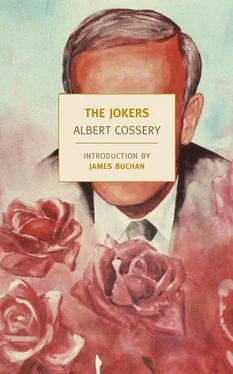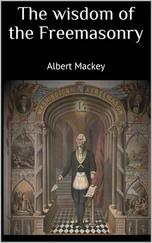“I know Urfy very well. He’s an eminently intelligent man. He claims that his mother isn’t mad, that in this world to call someone mad is absurd. I think he makes perfect sense.”
“I’ve heard that she still fills in for Urfy when he’s away. Apparently the students don’t notice a thing. They think she’s just sick.”
“It’s very possible,” said Heykal. “Personally, that’s something I’d like to see.”
Khaled Omar seemed taken aback by this display of cynicism.
“I can see that you’re a man who lives according to his ideas. I like that.”
“Why should there be a difference between a friend’s madness and other people’s?”
“I see what you mean,” said Khaled Omar, exploding with laughter.
But this time, there was no corresponding echo from the surrounding tables. The customers all looked as if someone had died. For almost a quarter of an hour, not a single young woman had paraded before the tables.
A small, distinct sound interrupted the silence that prevailed in the classroom. Urfy could identify it without lifting his eyes: one of the boys in the back was snacking on toasted watermelon seeds. Urfy had hesitated to intervene, not wanting to rouse the rest of the students, who — though momentarily subdued by the deadly midday heat — were apt to get excited about even the most minor occurrence. But the sound of the little brat gorging himself broke in on Urfy’s concentration and inspiration. He was working on the text for the poster praising the governor, which Heykal planned to paste up all over the city. He seemed calm on the outside, but inside he was savoring this opportunity to compose an apologia for this important figure. As he shaped his masterpiece it came to resemble an epitaph, something for the tombstone of an illustrious hero. Urfy was so caught up in his role that he almost began to believe the inane compliments he was lavishing on the governor. With characteristic generosity, he’d given him every imaginable virtue, using language usually reserved by the newspapers only for notorious criminals, with one or more wars on their conscience.
Again the irritating noise: Urfy stopped in mid-sentence, raised his head, and decided it was time to put an end to this behavior, which was disrupting the sacred hours of siesta. A quick glance identified the guilty party. It was the redoubtable Zarta: a very bright ten-year-old boy who was also one of the most ingenious liars of the century — Urfy sometimes wondered whether he had a minister of the current government in his class. To unleash the devious powers of the boy might turn out to be a fatal error. Urfy knew the whole class was just waiting for a sign to awaken from its torpor, so he resigned himself to suffering through his student’s obnoxious behavior. His desk was mounted on a platform, and he towered above the students: twenty boys and girls, aged six to ten, who’d been assigned the task of copying a list of words for common objects from the blackboard into their notebooks. Since the exercise was optional, most of them were dozing in their seats; in the stifling heat, they were in no mood for learning. Worn down and deflated, they let the flies devour their faces with impunity. Located in the basement of an old house, the classroom was a part of an apartment that Urfy shared with his mother. It was a fairly big room; a little daylight came in through the basement windows, which faced the sidewalk of a narrow commercial street. Most of the day, passing throngs of shoppers distracted the kids, who liked to shoot at their legs — the only visible part of them — with slingshots. But at this hour the street was empty; nobody would think of venturing out into this furnace.
Urfy took a handkerchief from his pocket and mopped his prematurely balding head. The bald spot was a mark of his professorial dignity; he never failed to groom and polish it well, like an expensive article of furniture in a poor person’s home. It was a local belief that premature baldness indicated wisdom and knowledge, and Urfy liked to encourage this illusion, lifting his hand frequently to his pate — especially when faced with skeptical parents who had the audacity to treat him like a worthless young boy. But baldness wasn’t the only physical mark of his genius: Urfy was also seriously nearsighted. He wore steel-rimmed glasses with impressively thick lenses that magnified the severity of his discerning gaze. A bald schoolmaster afflicted with myopia — that was more than enough to inspire the confidence of an illiterate population that had been raised with the axiom that a blind man can do no harm.
Compared to the outside, the classroom was a cool oasis. Urfy loved the stillness of the afternoon, when the children, dazed by the heat, quieted down for once. He gave himself over to the pleasures of reflection. After years spent in the dusty offices of one government ministry or another, he’d finally found a profession that suited him. His generosity and the sweetness of his character had always led him to prefer the company of children to that of adults. Adults scared him: in each of them he saw a potential killer. Urfy needed to be able to love without an ulterior motive, without beating around the bush, without trickery, and, above all, with forgiveness. But how can you forgive an adult? Too much selfishness, foolishness, brutality, stymied hopes, and bitterness separated him from his contemporaries. And ambition! They were all racked with ambition. The wanted to make it! But make it where? And when they finally had made it — to the heights of glory or wealth — they turned into brutes: repugnant, arrogant monsters incapable of feeling the slightest human sentiment. What Urfy admired in children was, above all, their complete lack of ambition. They were content with their daily lot; they strove for nothing but the simple joys of being alive. But for how much longer? It passed quickly — childhood and the marvelous pointlessness of youth — an undeniable truth that filled Urfy with bitterness. These children would later become men. They would join the pack of wolves; they’d abandon their intransigent love of purity and lose themselves in the anonymous crowd of murderers.
One day he had the idea of opening a private school; it was a strike against the official system of education, which aimed to initiate children into the ignoble trickery of a society in decay. The system was an insult to the charmed, innocent dreams of childhood. For a long time Urfy had felt that if he ever did have something to say, he’d say it to children; he had no use for adults. So he lost no time putting his plan into action. With the consent of his mother, who would be assisting him, he freed up a room of their small basement lodgings, furnished it with a few benches and a blackboard, and then — to add a touch of seriousness to the enterprise — had a local painter make a majestic sign, which he hung above the door of the building. A handful of neighborhood families, tempted by the proximity of this hallowed hall of science (and even more so by the modest fee), enrolled their children before the paint on the sign was dry. And then something extraordinary happened. Against all expectations, the children manifestly adored their schoolmaster; they would kill their own parents before relinquishing their seats in this unlikely school. The parents — good, simple people who’d never imagined their offspring would exhibit such hunger for learning — were stunned. What they didn’t understand was that at school their children inhabited an anarchic world that was perfectly to their liking, and that Urfy — despite his bald head and thick steel-rimmed glasses — was a dangerous practical joker. He spoke to his charges in a language that openly contradicted the language of adults. He inculcated them with a single principle: to know that everything grown-ups told them was false and that they should ignore it. So his classroom became a breeding ground for a generation of skeptics who honored no authority. Urfy was sometimes stunned by the unorthodox pronouncements that sprang to the children’s lips.
Читать дальше












